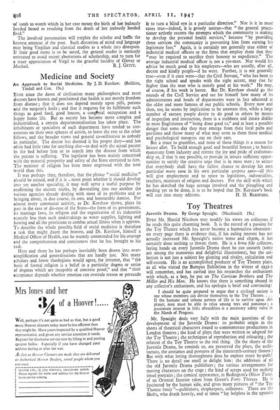Medicine and Society
EVER since the dawn of civilisation many philosophers and most doctors have known and proclaimed that health is not merely freedom from disease ; that it does not depend merely upon pills potions and the surgeon's knife • and that it requires for its fulfilment such things as good food, good houses' a congenial occupation and a happy home life. But as society has become more complex and industrialised, a certain departmentalisation has taken place. The inhabitants or specialists of each department have tended' to con- centrate on their own spheres of action, to leave the rest to the other fellows, and the broader views and general co-ordination to nobody in particular. The doctor has deemed it his proper duty—and has often had little time for anything else—to deal with the actual patient in the bed before him or to search into the disease from which the patient is suffering. The legislator has been mainly concerned with the material prosperity and safety of the State entrusted to him. The minister of religion has been more engrossed with the next world than this.
It was perhaps time, therefore, that the phrase "social medicine" 'should be coined, and if it is moot point whether it should develop into yet another speciality, it may well serve a useful purpose by reaffirming the ancient truths, by dovetailing into one another the various agencies already dealing with most of its problems and so bringing about, in due course, its own and honourable demise. For almost every communal activity, as Dr. Kershaw shows, plays its part in the ease or dis-ease of the State—the form of its government, its marriage laws, its religion and the organisation of its industries scarcely less than such undertakings as water supplies, lighting and heating and all the provisions to combat actual illness when it appears. To describe the whole possible field of social medicine is therefore a task that might daunt the bravest, and Dr. Kershaw, himself a Medical Officer of Health, can be warmly commended for his courage and the comprehension and conciseness that he has brought to his task.
Here and there he has perhaps inevitably been drawn into over- simplification and generalisations that are hardly just. Not many scholars and fewer theologians would agree, for instance, that "the basis of formal religion is a belief in a particular dogma or series of dogmas which are incapable of concrete proof," and that "their acceptance depends whether emotion can overrule reason or persuade It to turn a blind eye in a particular direction." Nor is it in most cases true—indeed, it is grossly untrue—that "the general practi-
tioner actively resents the attempts which the community is making to develop the personal health services," because "by providing these services the community is preventing him from earning his legitimate fees." Again, it is certainly not generally true either of industrial medical officers or the firms that employ them that they "may be required to sacrifice their honesty to expediency." The average industrial medical officer is not a yes-man. Nor would his advice be much good to his employers—who are usually, after all, decent and kindly people—if he were. Further, it is not generally true—even if it once were—that the Civil Servant, "who has been to the right school and speaks with the right accent, may rise far higher than the man who is merely good at his work." He may, of course, if his work is better. But Dr. Kershaw should go the rounds of the Civil Service and see for himself how many of its administrators and heads of departments were in fact educated at the older and more famous of our public schools. Every now and then, too, he seems by implication to be unaware that, while a large number of earnest people desire to do good to others by means of inspection and instruction, there is a stubborn and innate dislike in most Englishmen of "being done good to," and at least a possible danger that some day they may emerge from their local pubs and pavilions and throw many of what may seem to them these medical and psychological snoopers out on their ears.
But a truce to grumbles, and none of these things is a reason for laissez alley. To build enough good and beautiful houses ; to banish monotony from industry and restore the joy and pride of craftsman- ship or, if that is not possible,. to provide in leisure sufficient oppor- tunities to satisfy the creative urge that is in most men ; to secure that everybody shall have the fullest chance to develop his own particular mens sana in his own particular corpore sano—all this will give employment and to spare to legislators, industrialists, teachers, ministers of religion and doctors. For the skill with which he has sketched the huge acreage involved and the ploughing and seeding yet to be done, it is to be hoped that Dr. Kershaw's book


































 Previous page
Previous page